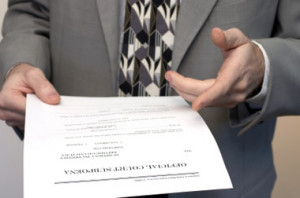How to Serve Court Papers Legally
 Serving court papers is a crucial step in legal proceedings, ensuring that all parties involved are properly notified and given the opportunity to respond. Whether you’re initiating a lawsuit or responding to one, understanding the proper way to serve court papers is essential to uphold the principles of due process. In this post, we’ll guide you through the process of serving court papers legally while highlighting specific rules of civil procedure in North Carolina and South Carolina.
Serving court papers is a crucial step in legal proceedings, ensuring that all parties involved are properly notified and given the opportunity to respond. Whether you’re initiating a lawsuit or responding to one, understanding the proper way to serve court papers is essential to uphold the principles of due process. In this post, we’ll guide you through the process of serving court papers legally while highlighting specific rules of civil procedure in North Carolina and South Carolina.
Understanding the Importance of Proper Service
Proper service of court papers is not just a formality; it’s a constitutional right that guarantees all parties have a fair chance to present their case. Failure to serve court papers correctly can lead to delays, incorrect judgments, and even dismissal of your case. It’s crucial to follow the rules and guidelines of your state’s civil procedure to ensure that your legal actions are valid. Continue reading
What Happens if You Are Never Served Papers
 In legal proceedings, serving papers is a critical step that ensures due process and the right to a fair trial. Whether you’re involved in a lawsuit, divorce, or other legal matter, being served with legal documents is a fundamental aspect of the legal system. However, what happens if you are never served with these papers? In this post, we’ll explore the consequences and implications of not being served papers in a timely manner.
In legal proceedings, serving papers is a critical step that ensures due process and the right to a fair trial. Whether you’re involved in a lawsuit, divorce, or other legal matter, being served with legal documents is a fundamental aspect of the legal system. However, what happens if you are never served with these papers? In this post, we’ll explore the consequences and implications of not being served papers in a timely manner.
The Importance of Serving Papers
Serving papers, also known as “service of process,” is the official way of notifying individuals about legal actions taken against them. This notification is essential to uphold the principle of due process, which guarantees that all parties have the opportunity to respond and defend themselves in a court of law. Without proper service of process, legal proceedings can be unjust and one-sided. Continue reading
Can Process Servers Legally Lie?
 Here at Accurate Serve of Charlotte, we take pride in upholding the highest standards of integrity, professionalism, and ethical conduct. One question that occasionally arises in the field of process service is whether process servers can legally lie to the recipients of process about their identity or the purpose of their visit. In this post, we aim to provide clarity on this matter and shed light on the ethical and legal considerations involved.
Here at Accurate Serve of Charlotte, we take pride in upholding the highest standards of integrity, professionalism, and ethical conduct. One question that occasionally arises in the field of process service is whether process servers can legally lie to the recipients of process about their identity or the purpose of their visit. In this post, we aim to provide clarity on this matter and shed light on the ethical and legal considerations involved.
The Importance of Honesty in Process Service
Process service is a critical component of the legal system, ensuring that individuals are notified of legal actions against them and giving them the opportunity to respond. Honesty and transparency are fundamental principles that underpin the process service profession. It is essential to maintain the trust and integrity of the legal system by conducting ourselves truthfully and ethically. Continue reading
Ways to Find a Missing Person that Needs to be Served
 As a process service agency, Accurate Serve of Charlotte understands the challenges that can arise when trying to locate and serve a missing person. Whether you are a legal professional, an individual pursuing a legal matter, or someone requiring legal documents to be served, finding a missing person can be a crucial step in ensuring due process. In this post, we will explore some effective methods and strategies to help you find a missing person who needs to be served, specifically in the regions of North Carolina and South Carolina. Continue reading
As a process service agency, Accurate Serve of Charlotte understands the challenges that can arise when trying to locate and serve a missing person. Whether you are a legal professional, an individual pursuing a legal matter, or someone requiring legal documents to be served, finding a missing person can be a crucial step in ensuring due process. In this post, we will explore some effective methods and strategies to help you find a missing person who needs to be served, specifically in the regions of North Carolina and South Carolina. Continue reading
How Technology is Used for Serving Process
 In an era defined by technological advancements, the legal industry has not been left untouched. The traditional methods of serving process are being augmented by innovative digital solutions, revolutionizing the way legal documents are delivered. In this post, we will explore how technology is reshaping the process serving landscape, with a focus on the emergence of digital communication and social media as methods to meet the requirements of due process.
In an era defined by technological advancements, the legal industry has not been left untouched. The traditional methods of serving process are being augmented by innovative digital solutions, revolutionizing the way legal documents are delivered. In this post, we will explore how technology is reshaping the process serving landscape, with a focus on the emergence of digital communication and social media as methods to meet the requirements of due process.
The Rise of Digital Communication
Digital communication platforms have become an integral part of our everyday lives, offering instantaneous connectivity across the globe. Recognizing this shift, the legal system has begun to embrace these platforms as potential means of serving process to individuals or entities that are not easily served otherwise. While traditional methods such as personal delivery, certified mail, and service by publication notices remain valid, digital communication offers additional avenues to ensure effective service for evasive recipients. Continue reading
Is it Legal for a Process Server to Lie?
 As a reputable process service agency serving the legal community in both North Carolina and South Carolina, Accurate Serve® of Charlotte is committed to upholding the highest ethical standards. We understand the importance of integrity and accuracy when it comes to serving legal documents. In this post, we aim to debunk a common misconception surrounding process servers—whether it is legal or not for them to lie. Let’s explore this topic and shed light on the truth. Continue reading
As a reputable process service agency serving the legal community in both North Carolina and South Carolina, Accurate Serve® of Charlotte is committed to upholding the highest ethical standards. We understand the importance of integrity and accuracy when it comes to serving legal documents. In this post, we aim to debunk a common misconception surrounding process servers—whether it is legal or not for them to lie. Let’s explore this topic and shed light on the truth. Continue reading
What is a Process Server?
 Have you ever heard the term “process server” but wondered what it actually means? In the legal world, process servers play a crucial role, ensuring that due process is followed, and legal documents are delivered to the intended recipients. In this post, we will explore the role and significance of process servers, shedding light on their responsibilities and the importance they hold in the legal system.
Have you ever heard the term “process server” but wondered what it actually means? In the legal world, process servers play a crucial role, ensuring that due process is followed, and legal documents are delivered to the intended recipients. In this post, we will explore the role and significance of process servers, shedding light on their responsibilities and the importance they hold in the legal system.
Understanding the Role
A process server is an individual responsible for delivering legal documents, such as summons, complaints, subpoenas, and court orders, to individuals involved in a legal proceeding. This vital function serves as a fundamental aspect of the justice system, ensuring that all parties are properly and promptly informed of legal actions against them and have the opportunity to respond. Continue reading
Can Someone Else Accept Papers Served by a Process Server?
 In legal proceedings, the delivery of legal documents is a crucial step to ensure that all parties involved have proper notice of the proceedings against them. In North and South Carolina, process servers are responsible for serving legal papers to individuals. However, a common question that arises is whether someone other than the person named can accept papers served by a process server. In this post, we will explore the rules and guidelines surrounding this issue in the Carolinas.
In legal proceedings, the delivery of legal documents is a crucial step to ensure that all parties involved have proper notice of the proceedings against them. In North and South Carolina, process servers are responsible for serving legal papers to individuals. However, a common question that arises is whether someone other than the person named can accept papers served by a process server. In this post, we will explore the rules and guidelines surrounding this issue in the Carolinas.
Legal Requirements for Service
To understand the acceptance of papers served by a process server in North and South Carolina, it is essential to grasp the legal requirements for proper service. In general, service must be made in person to the individual named in the legal document. This ensures that the recipient is personally aware of the legal proceedings and has an opportunity to respond. Continue reading
Tips for Spotting a Fake Process Server
 Using a credible process server to serve process in North and South Carolina is essential. Only process servers who meet each state’s process server requirements may serve legal process in that state. If you accidentally use an unqualified server, any work they do for your case will be invalid, resulting in delays, extra costs, and possibly dismissal of the entire case.
Using a credible process server to serve process in North and South Carolina is essential. Only process servers who meet each state’s process server requirements may serve legal process in that state. If you accidentally use an unqualified server, any work they do for your case will be invalid, resulting in delays, extra costs, and possibly dismissal of the entire case.
To avoid service of process problems, you should ask the following questions to spot unqualified process servers: Continue reading
What are the Rules Process Servers Must Follow?
 Process servers play a critical role in the legal system, ensuring that individuals and entities receive notice of legal proceedings against them. As a process service agency serving both North Carolina and South Carolina, we understand more than most the importance of learning and following the rules and regulations governing process service. In this post, we’ll discuss some of the key rules all process servers must follow.
Process servers play a critical role in the legal system, ensuring that individuals and entities receive notice of legal proceedings against them. As a process service agency serving both North Carolina and South Carolina, we understand more than most the importance of learning and following the rules and regulations governing process service. In this post, we’ll discuss some of the key rules all process servers must follow.
Serve in a Timely Manner
One of the most important rules for process servers is to serve legal documents in a timely manner. Process servers must deliver the documents to the intended recipient within a specified period, which varies by state and by the type of legal action being taken. For example, in North Carolina, a process server has 60 days to serve a defendant after receiving most types of documents. In South Carolina, the deadline is 30 days for most services. Continue reading
